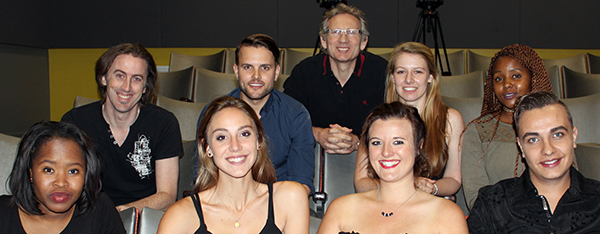The state-of-the-art audio-visual studio that was unveiled in the beginning of this year reaped its first crop during a historic moment. On Wednesday 28 October 2015, the eight pilot students in the Postgraduate Programme in Film and Visual Media, which was launched at the beginning of this year, had their first big screen experience. Eight films were premiered in one night at the University of the Free State (UFS) Bloemfontein Campus.
An intimate movie theatre was brimming with friends and family of the students, their lecturers, and judges who doubled as moderators. This was no ordinary motion picture viewing. The apprentice filmmakers’ productions were undergoing formal external examination.
Judge by a legend
Katinka Heyns critiqued the student’s final products. Heyns is a renowned filmmaker, actress, director, producer, and founder of the production company, Sonneblom Films. She has numerous awards to her name, including the Career Contribution and Innovation Award, Legendary Award for Woman in Film and Television, and Medal of Honour for Paljas, which were presented by the Absa Klein Karoo Nasionale Kunstefees (KKNK), International Crystal Award, and South African Academy for Science and Arts, respectively.
Johanet Kriel and Chris Vorster from the film school also assisted as moderators.

The cinema exam
Each student had 20 minutes to provide a synopsis for the viewers, and screen the movie. At the end, The Secret of the Golden Flower, written and directed by Rudiker Janse van Rensburg, and The Nexus Effect, written and directed by Gawie Myburgh were judged the best movies “Both films had had clear and creative story lines, a solid structure, and quality editing,” said Chris Vorster.
Despite technical teething problems, all the students showed a great deal of talent and passion for filmmaking. “Given the time constraints and technical challenges, I’m very relieved that we actually got films on screen. They all impressed me with their creativity. Mission accomplished,” added Vorster.
The films
• The Blood of Barbara (Yvonne Allwright)
• Diary of an Oreo (Nonsindiso Qwabe)
• GeFop! (Hendrik Cronje)
• The Nexus Effect (Gawie Myburgh)
• The Secret of the Golden Flower (Rudiker Janse van Rensburg)
• Well ain’t that a Coinkydink?! (Rethabile Radebe)
• What Lurks in the Dark…(Rese Moore)
(Photo caption: Front row from left: Nonsindiso Qwabe, Suné van Heerden, Theresa Moore, Gawie Myburgh. Middle row: Rudiker Janse van Rensburg, Hendrik Cronjé, Yvonne Allwright, and Rethabile Radebe. Back: lecturer: Chris Vorster.)